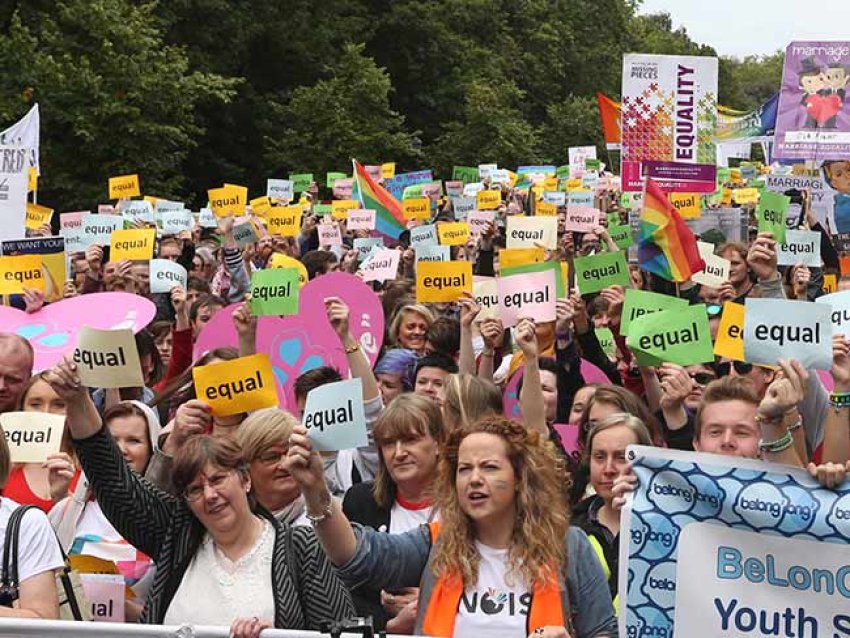
With the support of all of the political parties in Dublin's parliament (the Dail), a May 22 referendum on same-sex marriage could bring official state recognition for Ireland’s gay community and their relationships for the first time.
Homosexuality in Ireland was decriminalised in 1993. The referendum could mark a further break from a culture which has for decades forced LGBTI members to live covertly or suppress their identity entirely.
The referendum has been opposed by most, though not all, of Ireland’s clergy. Polls have shown strong opposition among Ireland’s oldest age groups.
However, a well-funded “Yes” campaign has been broadly supported by public and media figures, as well as political activists from all parties. It appears on course for a historic victory by a two- or three-to-one margin -- barring a major polling error.
Sinn Fein and other republican, left-wing and progressive groups have broadly supported the Yes campaign, and Sinn Fein has canvassed voters in several areas.
Sinn Fein president Gerry Adams said many people had a family member, friend or work colleague who was gay. “They want what we want -- the right to live their lives as full and contributing citizens,” he said.
Adams called on people to join the canvass or to take part in the “informal campaign” by talking to friends, family members, colleagues and neighbours and asking them to vote “Yes”.
The party’s justice spokesperson, Padraig Mac Lochlainn, said that as a republican party, equality was at the core of what Sinn Fein stood for. He said that despite polls showing a clear lead for the ‘Yes’ side there was “no room for complacency”.
Video: Vote YES to Marriage Equality. Sinn Féin.
Taoiseach (Prime Minister) Enda Kenny has also backed the campaign, which has the support of both government parties, Fine Gael and Labour. Kenny asked: “Are the Irish people going to deny their own kith and kin their right to a marriage contract?”
Following angry scenes again in the Dail in recent days over Kenny's failure to answer questions from left-wing representatives, with parliament suspended twice after Kenny insulted members of the opposition, the Taoiseach urged people to exercise their democratic mandate on May 22.
Kenny predicted that the result in the referendum would be closer than opinion polls have suggested, amid fears of a silent “No” vote in conservative areas. He said: “No referendum can be passed unless people vote for it.”
The Catholic Church has officially come out against the proposal. The Primate of All Ireland, Archbishop of Armagh Eamon Martin, said that while “God loves all of us equally”, the church wanted to “respect the dignity of difference between male and female”.
Martin told a congregation in Lourdes that the Catholic Church was not trying “to hurt or offend anyone” by calling for a No vote.
However, a high-profile nun, Sister Stanislaus Kennedy, has announced that she will be voting Yes. Stan, who is a member of the Sisters of Charity and founded the Focus Ireland charity, said: “I have thought a lot about this. I am going to vote Yes in recognition of the gay community as full members of society.
“They should have an entitlement to marry. It is a civil right and a human right.”
Video: Awesome Marriage Equality Ad in Ireland - One Of The Best Same Sex Marriage Ads I've Seen. Kim Smythe.
Apathy of presidential age vote
In contrast, a second referendum to be held the same day on the subject of age inequality has received little media attention and is likely to be rejected, polls have shown. The proposal to reduce the age for presidential candidates from 35 to 21 looks set to be defeated by a wide margin.
Frustration at the government’s failure to present more meaningful political reform proposals to the voters, such as votes for emigrants, has been blamed for the lack of interest in the “forgotten referendum”.
Although supported by both government parties, Sinn Fein and pro-equality activists across the state, the high level of opposition to the measure is also being linked to the older age profile of the political establishment and a general lack of awareness in the mainstream media of the issue of age discrimination.
By-election
On the same day as the two referendums, a by-election is taking place in the Carlow-Kilkenny constituency in the southeast of Ireland. Fianna Fail’s Bobby Aylward, a former member of the Dail, is the bookies’ favourite.
The result will depend heavily on whether support for the Aylward “brand” in the constituency has recovered since the 2008 financial crisis. There have been reports that Fianna Fail leader Micheal Martin could face a leadership crisis if he loses the crunch by-election.
The vote is also significant in that it is the first electoral outing by Renua, a new right-wing political party.
Sinn Fein’s candidate, Kilkenny councillor Kathleen Funchion, is expected to poll well. If not successful this time, her campaign could lay the groundwork to challenge for a seat in the next general election.
A local councillor, trade union worker, and mother-of-two, Funchion has been getting strong support on the doorstep. She said the themes people are raising are similar to those during last May’s local elections -- unemployment, taxation, childcare, affordable housing. Water charges are also a big issue.
“I was in Bagenalstown,” she said. “One woman I spoke to was living on her own -- she was really worried. She was trying to spend less time in the shower and things like that.”
Housing is another major issue -- particularly in Kilkenny City. “There is hardly anywhere to rent, and the few places there are are way outside the rent allowance limit, or landlords are not taking it,” says Kathleen.
“People are just being squeezed. Nobody’s wages have gone up.”
[Reprinted from Irish Republican news.]